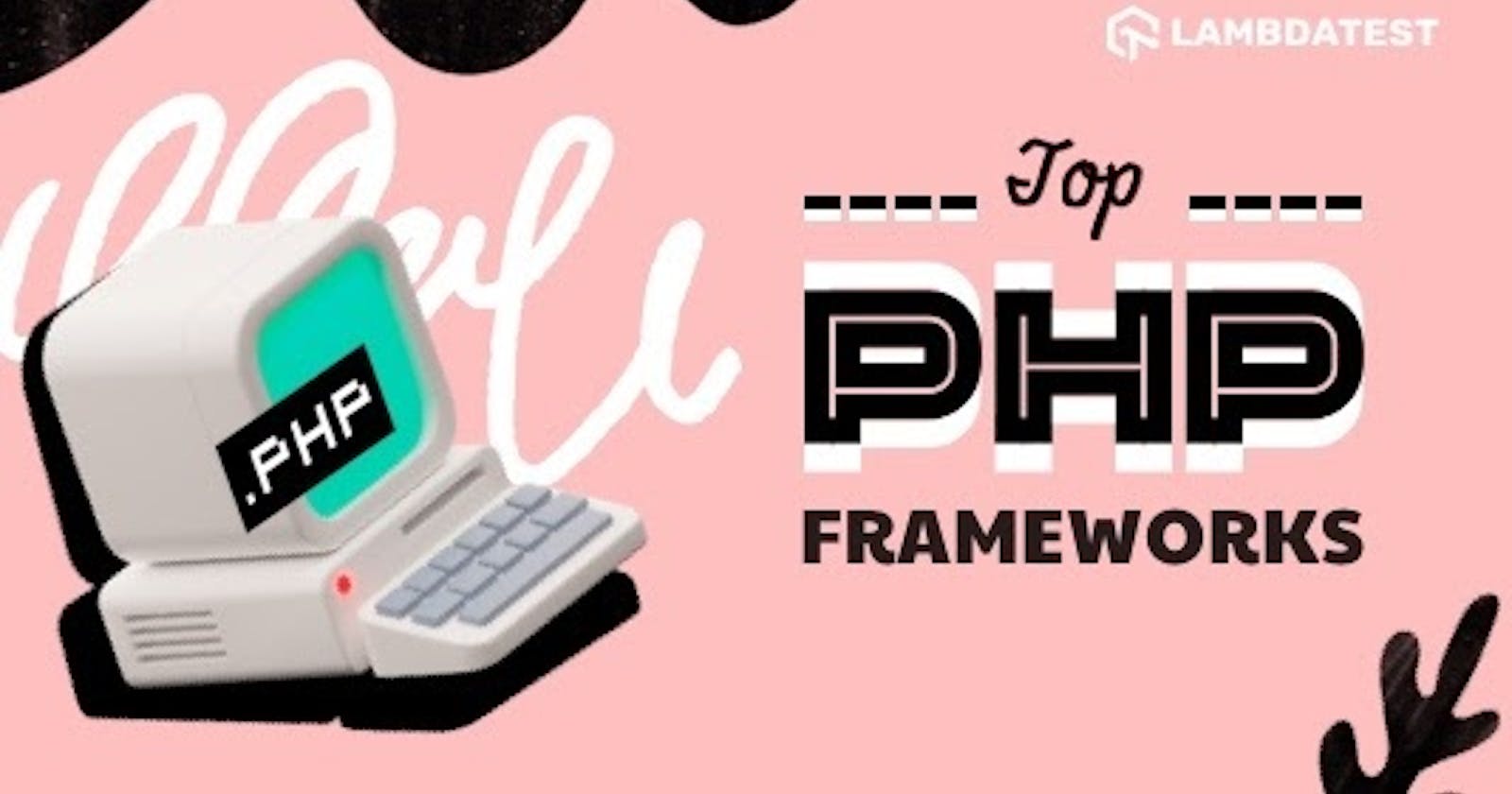With an average global salary of $39k, PHP is one of the most popular programming languages in the developer community. It’s the language behind the most popular CMS, WordPress. It is in-use by 79% of total websites globally, including the most used social network- Facebook, the largest digital encyclopedia – Wikipedia, China’s news giant Xinhuanet, and Russia’s social network VK.com.
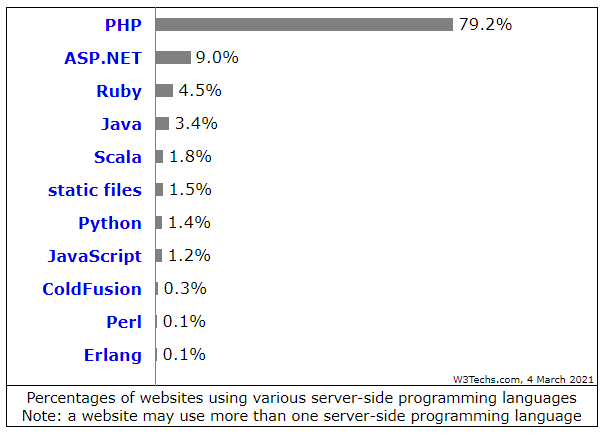
It would be unfair not to credit the rising number of PHP web development frameworks in popularising PHP. Today, we’ve some really good web development frameworks in PHP like Laravel, CodeIgniter, CakePHP, etc. These development frameworks provide a set of libraries & API functions to accelerate the web application development process securely.
Sadly, despite all these glittery facts & figures, some dare say “PHP is a dead language.” In fact, in a recent survey, 62% of respondents voted PHP as one of the most dreaded programming languages. In the same study, only 3% desired to learn PHP. But google trends for search keywords “php” and “javascript” narrate another story. While the debates will continue, be assured that PHP is not dying anytime soon. Having said that, check out the 9 most popular PHP frameworks for web development.
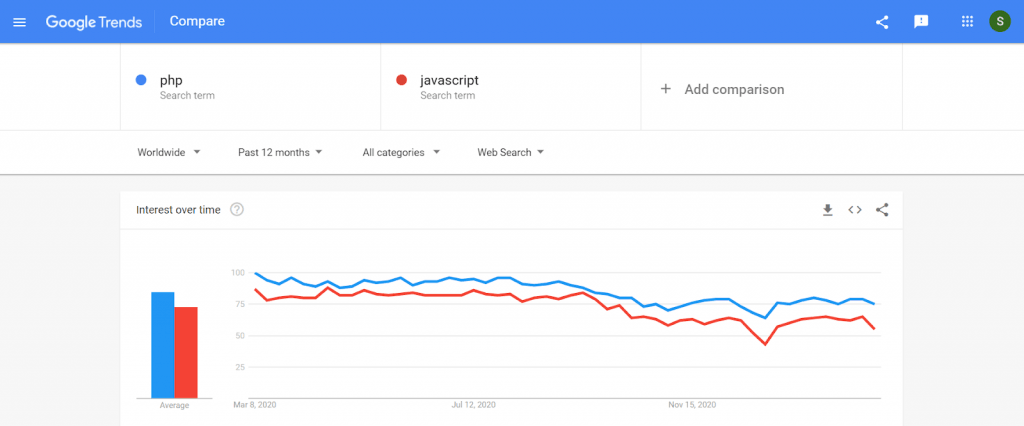
9 best PHP frameworks for website development in 2021
1. Laravel
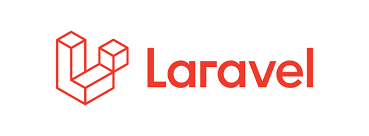
Laravel is one of the most popular PHP frameworks for web development with 64k+ stars on GitHub. Though it ranks 7 on PHP Benchmarks list of top-performing web development PHP frameworks, it tops our list given its huge community, rich feature set, and ease of use.
Why should you consider Laravel?
- Open source, huge community, Extensive documentation, Zero overheads for CFOs, LTS
Laravel is an open-source web development framework. Of-course, free. It enjoys awe-inspiring support from the PHP developer community. And as a result, Laravel wheels are always in motion. Right from its launch in 2011 to the time of writing this insight, there have been 20 mega releases, Laravel 8 being the latest stable version. The Laravel web framework community provides LTS versions too. Laravel 6.0 LTS is currently under support. Versions before it are no longer maintained.
- Performance, Security & Scalability, faster-time-to-market
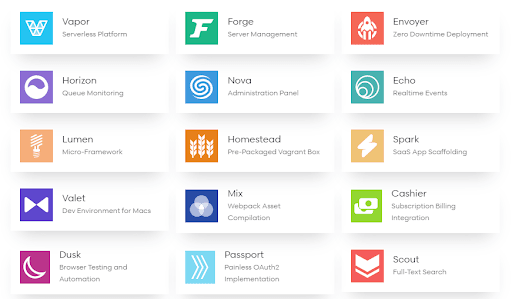
You can securely develop Laravel powered apps using MVC architecture. Using an object-oriented and functional programming approach, you can develop highly modular code-bases for your application. This modularity and segmented architecture make the Laravel web framework highly extensible. That means Laravel developers can leverage ready-to-use first-party packages like Envoy, Passport, Horizon, Cashier, JetStream, and Fortify. This also saves significant development time, and new products can be shipped with faster-time-to-market. In-built authentication features can leverage encrypted storage of data for enhanced security. Performance can be boosted by using session & cached memory, optimizing the garbage collection process would also mean improved task execution.
Rich off-the-shelf features
- Built-in access management features for easy authentication & user management
- Easily integrate with popular email services like Amazon SES, sendmail, etc., Delivering messages through SMS/ Slack is also possible.
- In-built Eloquent ORM to convert data between incompatible type systems. Eloquent ORM is an API interface to easily interact with the database. Developers don’t need to write complex queries.
Advanced Eloquent -ORM query example to select destinations –
use App\Models\Destination;
use App\Models\Flight;
return Destination::addSelect(['last_flight' => Flight::select('name')
->whereColumn('destination_id', 'destinations.id')
->orderByDesc('arrived_at')
->limit(1)
])->get();
- Bundle packaging system and composer dependency manager for integrating framework agnostic packages to your PHP web development project. You may use ‘Packalyst,’ which is a huge collection of Laravel PHP packages, 1500+ in total.
- “Reverse routing” for linking and routes, CLI interface, “Blade templating engine” for designing templates, “RESTful controllers” for request handling, in-built “PHUnit Testing,” “Lazy collection,” “Database seeding,” “Real Time-event broadcasting,” “background processing” are some other features that make development work with Laravel an easy-peasy experience.
These are the reasons it is considered among the best PHP frameworks for website development.
Who uses the Laravel framework for their web applications?
- Mastercard
- Razorpay
- Olx
- Wattpad
- TransferGo
- 9GAG, and 3000+ companies
Why explore Laravel framework alternatives for web development?
- No built-in support is available in RoR or Django framework.
- Easy to start, complex to master.
- Usual open-source LTS issues, i.e., migration issues and incompatibility of newer versions with older ones.
2. CodeIgniter
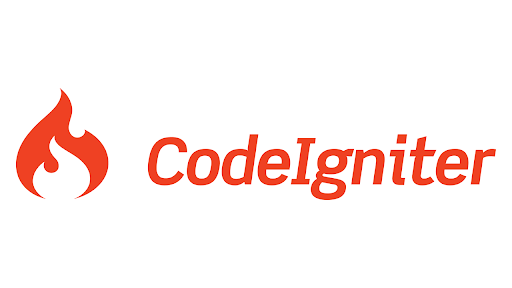
CodeIgniter is a rapid web application development framework with a ridiculously small size. CodeIgniter 4, the latest version of CodeIgniter, is a mere 1.2 MB in size. Like Laravel, it’s open-source and boasts 18k+ stars on GitHub. Just because of how bare-bone it is, we have included it in the second position. Like several other frameworks, CodeIgniter provides a set of libraries and an intuitive interface to accelerate PHP web app development. Currently, this is not tracked by PHPbenchmarks.com but is considered among the best PHP frameworks for website development.
What are the features of CodeIgniter?
Server requirements
- Codeigniter framework v4 requires PHP 7.2 or above.
- Supports MySQL, PostgreSQL, SQLite3
- It is partly PSR-compliant. This means it follows PHP standard recommendations for class and file naming standards, implements autoloading and logger interface, but doesn’t strictly follow caching or HTTP message interface.
- Easy to get started. You may directly download CodeIgniter, or you can use composer to install it. Consider it as the “create-react-app” of PHP-CodeIgniter. All you need to do is execute the below command to get started with CodeIgniter:
composer create-project codeigniter4/appstarter project-root
- CodeIgniter applications can be built using MVC architecture and adhere to object-oriented programming practices.
- It provides classes for FTP, image manipulation, email sending, user-agent, unit testing, security, encryption, caching driver, throttling, typography, pagination, form validation, etc. It also provides two tools, i.e., Timer & Iterator, for benchmarking your PHP application.
- You can carry out feature testing by extending FeatureTestCase or FeatureTestTrait class. The template for writing test cases looks as below-
<?php namespace App;
use CodeIgniter\Test\FeatureTestCase;
class TestFoo extends FeatureTestCase
{
public function setUp(): void
{
parent::setUp();
}
public function tearDown(): void
{
parent::tearDown();
}
}
Who uses CodeIgniter for their web applications?
- Sprout Social
- Buffer
- Grindr
- 3M
- Geekyants
- Accenture
- Ola
- Remitly
- Amplify
- BigBazaar, and 1700+ others
Why explore alternative web development frameworks?
- No templating engine
- No official stand on LTS versions
- No in-built authentication, authorization features
- Developers have to write their modules from scratch, while in other best PHP web frameworks like Laravel, a rich set of in-built ready-to-use modules are available.
3. Symfony

PHP Benchmarks rank Symfony at number 3 in the list of PHP frameworks for web development. With 24.5k+ GitHub stars, Symfony is not just a PHP web development framework but also provides a set of 50 stand-alone reusable PHP components for faster web app development. Using Symfony, you can develop web applications, microservices, and APIs too. With commercial support from SensioLabs, Symfony stands ahead of many on the list.
What are the features of Symfony?
- 50+ decoupled components easily installable using composer.
- You’ve ‘Lock’ component for managing access to shared resources, ‘Routing’ for obviously implementing routes, ‘Guard’ for creating complex authentications, ‘MIME’ for manipulating MIME messages and creating advanced emails, ‘Security’ for advanced authorizations, ‘PHPUnit Bridge’ for test reporting.
- Symfony uses open-source Doctrine ORM for database operations. It’s a great alternative to writing repetitive SQL code.
- Symfony supports a diverse set of databases MySql, Oracle, PostgreSQL, SQLite, SQL Server, and SAP Sybase, etc.,
- Though PHP itself is a templating language, Symfony provides Twig, a fast, secure, and flexible templating engine. It makes templating concise through its template-oriented syntax. For example, printing default value while looping over an empty array looks as compact as:
{% for player in players %}
* {{ player.score }}
{% else %}
No players data.
{% endfor %}
This is why it is counted among the best PHP frameworks for website development.
Who uses Symfony for their web applications?
- BlaBlaCar
- Spotify
- Magento
- Statista
- Practo
- Naukri.com
Why explore alternative web development frameworks?
- For simpler projects, Laravel would make more sense.
- Laravel beats Symfony in performance.
4. Laminas Project
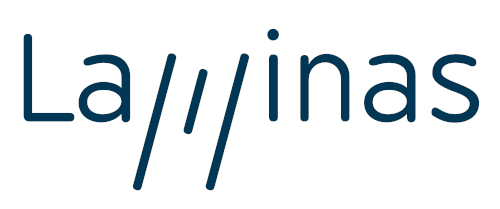
Laminas Project is a continuation of one of the most popular PHP web development frameworks, i.e., the Zend PHP framework. Zend had 5k+ GitHub stars before transitioning into the Laminas Project. Zend v3 still ranks 5th in PHPBenchmark. Laminas has three major verticals:
- Mezzio for building middleware applications in PHP.
- Mezzio for building middleware applications in PHP.
- API tools for creating RESTful APIs in PHP.
What are the features of Laminas?
- It is indeed an enterprise-ready PHP web development framework. Laminas Project provides components for dependency injection, caching, form validations, PubSubHubbub(WebSub) interactions, logging, routing, pagination, session managements, diagnostic tests, event dispatchers, feed parsers, etc.
- Event-driven flexible MVC framework for building scalable PHP applications.
- Supported databases include MySQL, MS SQL Server, Oracle, MariaDB, IBMDB2, PostgreSQL, etc.
Some noteworthy components of the Laminas framework, apart from the usual ones:
- ‘Laminas-log’ – is a PSR-3 compliant logger with support for filtering and formatting.
- ‘Laminas-form’ for implementing complex forms, casting them into business objects.
- Laminas-math’ for generating cryptographic numbers
- ‘Laminas-session’ for object-oriented interface to session & storage
- ‘Laminas-cache’ for caching implementations and codified caching storage strategies for callbacks.
- ‘Laminas-db’ for database abstraction, SQL operations.
- ‘Laminas-xml2json’ for converting xml documents to JSON format.
- ‘Laminas-SOAP’ for creating SOAP applications and interacting with them.
Who uses Laminas for their web applications?
According to LinuxFoundation, the Zend framework (now Laminas) has been downloaded more than 400 Mn times. The prominent users include BNP Paribas, BBC, and Offers.com.
Why explore alternative web development frameworks?
- Laravel beats ZEND in terms of performance.
- Documentation is not beginner-friendly.
5. Yii

The Yii framework has a whopping 11Mn+ downloads from Packagist and 13.6k+ stars on GitHub. Yii, branded as ‘YES, it is!’, is a fast, secure, flexible PHP framework for web development, especially for building MVC architecture websites. It ranks 4 on the PHP Benchmarks list. Yii is a strictly Object-Oriented PHP framework and requires knowledge of inheritance, polymorphism, etc.
What are the features of Yii?
- Thorough Documentation – From installation to explaining web concepts to deploying applications and everything in-between, Yii has documented it all.
- Robust Cache Component – From server side caching to client-side in browser caching, Yii has easy to follow guides for implementing different sorts of caching i.e., data caching, fragment caching, page caching, query caching, HTTP caching etc. For instance,
// to fetch cached data
$data = $cache->get($key);
if ($data === false) {
// $data is unavailable. Compute it from scratch
$data = $this->computeFromScratch();
// now store the static data to cache
$cache->set($key, $data);
}
// $data will be available for cache retrieval.
- You can rapidly prototype an MVP using the GII2 code generator provided by Yii to implement CRUD operations for a database.
Security features – Yii provides frameworks & guidelines for implementing authentication, authorization, cryptographic features, password handling, trusted proxies, and headers.
- For example, authentication can be implemented using the ‘User component’ and implementing Yii’s ‘IdentityInterface’ interface.
- Similarly, Yii provides components and classes for handling requests, working with databases, displaying data, fetching data, debugging code, and many more.
Who uses Yii for their web applications?
- Deloitte
- Fujitsu
- Lenovo
- Discovery
- Lulo
- Utrip
Why explore alternative web development frameworks?
- Strong object-oriented programming prerequisite.
- If performance is a priority, then better alternatives are available.
6. CakePHP
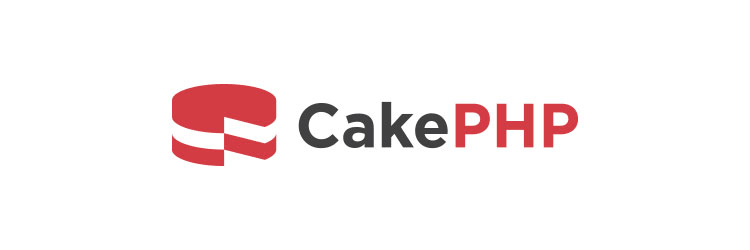
CakePHP is an open-source web development PHP framework. It’s ranked 6th in PHP Benchmarks, just above the Laravel web development framework. The newly released v4.0 comes with a renovated skeleton design and provides APIs to enable developers for rapid application development. On GitHub, it has 8.3k+ stars and 555 contributors. For commercial support, you have cakeDC. CakeDC is the organization behind CakePHP. You can build highly secure and scalable web applications, including social networks, eCommerce, and online collaboration platforms using CakePHP.
What are the features of CakePHP?
- It adheres to MVC architecture for PHP-powered web application development.
- Supports other popular design patterns like Associative Data Mapping, Front Controller, etc.
- Supports other popular design patterns like Associative Data Mapping, Front Controller, etc.
- You can leverage code generation and scaffolding features for faster prototype development. Scaffolding refers to techniques to easily access databases or generate project code using certain high-level tools.
- Like many other web development frameworks in this list, the CakePHP web development framework also gets shipped with all batteries included. You have ready-to-use Caching, authentication, validation, internationalization, database APIs features.
- Minimal configuration required. No need for YAML or XML config files.
- You get paid support if required.
You’ve Namespace cake/ORM with classes for
- Eager-loading (EagerLoader)
- registry/factor tables (TableRegistry)
- Handling and loading of construction behavior objects (BehaviorRegistry)
- Converting array data into entities (Marshaller)
This makes it count among the best PHP frameworks for website development.
Who uses CakePHP for their web applications?
- Hyundai
- BMW
- Blendtec
- MIT
- Billabong
- Edureka
- House Party
Why explore alternative web development frameworks?
- Abrupt migrations.
- If you’re building performance-critical applications. It’s not like CakePHP’s performance is not good, but if performance comparing websites have ranked other frameworks to be better performing, you must consider their candidature.
7. Slim

Unlike the other web development PHP frameworks mentioned above, Slim, as the name goes, is a PHP micro-framework for web development. Are you aware of micro-frameworks? The ones listed above are full-stack frameworks. Slim, with 10k+ stars on GitHub, is a minimalistic web application and API development framework. Basically, this means you will only have the recipe and won’t get any ready-to-consume functions. In a full-stack framework, you get components, classes, interface for authorization, authentication, routing, paging, database operations, etc. In micro-framework, you get bare minimum support for HTTP requests and routing requests to appropriate controllers. Then why choose a micro-framework? Because it gives you flexibility and high-extensibility.
What are the features of Slim?
- Efficient, fast routers – Slim ships with powerful ROUTER. This maps routes to specific HTTP request handler methods and URLs. Router natively supports different URL types, including the ones with parameters and patterns. Pattern-based URLs are commonly implemented in e-commerce apps.
- PSR-7 Support – It’s necessary to implement PSR-7 implementation in your Slim project.
- Extensible with first-party PHP components and third-party PHP components on packagist.
Who uses Slim for their web applications?
- Gamned
- Bootiq
- AgriTask
- GreenBot
- HHEY
Why to explore alternative web development frameworks?
- If you need a full-stack framework.
- Steep learning curve for complex projects.
- For large projects, microframeworks are not suited. No point in reinventing the wheels.
8. Phalcon
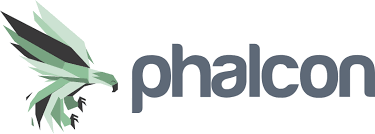
Phalcon is a platform-agnostic ridiculously fast web development PHP framework delivered as a C-extension. It provides high performance and low resource consumption. On GitHub, it has scored 10k+ stars and has 242+ contributors.
What are the features of Phalcon?
- Low overheads for MVC architecture web applications – It is compiled to the native platform and is not interpreted.
- The C-extensions classes and functions are loaded with PHP on the webserver as the daemon process starts.
- You can build both single and multi-module MVC applications, as depicted in the image above.
- You can leverage dependency injection features, autoloader features, phalcon ORM for playing with DB records.
- It natively supports PostgreSQL, MySQL, and SQLite.
- You have Phalcon query language for writing queries, Phalcon transactions to ensure data integrity.
- The Phalcon cache component supports backends like Redis, Memcached, Mongo, etc., for quick access to pre-processed data.
- Form-builder, flash messages, VOLT templating engine, translation components are other features worth noting.
These are the main reasons to consider Phalcon among the best PHP frameworks for website development.
Who uses Phalcon for their web applications?
- SocialVeo
- KingHost
- Proshore
- Urban Sports Club
- PlaceOnAir
- ESCHER
Why explore alternative web development frameworks?
- Not ideal for shared hosting.
- No C know-how is required, but if a critical framework level issue arises, you need to debug in C.
- More Popular framework alternatives with huge communities are available.
9. Lumen
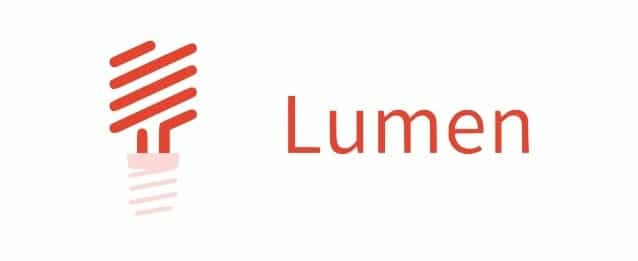
Lumen is a micro-framework for developing PHP-powered web applications. It is written in PHP and created by the Laravel team itself. Lumen has 7.1k+ stars on GitHub and 45+ contributors.
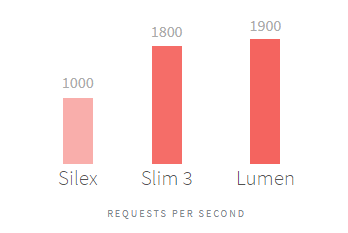
What are the features of Lumen?
- You can build lightning-fast APIs and microservices for Laravel based applications using Lumen. It is faster than Slim and Silex, the other popular alternative PHP microframeworks.
- You can use Laravel features like Eloquent ORM, testing, validation, authorization, caching, queues, views, etc., with minimal configurations.
- Easily upgradable to full-fledged Laravel application if need be.
- Can leverage Laravel Homestead for meeting system requirements. It works with PHP>=7.3
Can leverage Laravel Homestead for meeting system requirements. It works with PHP>=7.3
- Threat data science
- Index.co
- Publy
- Piio
- ZenChef
- Agro24
- mPokket
- Rooter
- Codepolitan
Why explore alternative web development frameworks?
- If you don’t like Laravel.
- If you need a full-stack and best PHP web framework.
- More suited to microservices and APIs, for large-scale applications, consider a full-stack PHP web development framework.
Wrapping Up!
PHPixie, FuelPHP, Ubiquity, Symlex are some other popular & rising PHP web development frameworks. If you’re building a new web application, we think you must be informed that multiple intuitive web development frameworks have evolved over the years. AngularJs, ReactJs ( not a framework but a library), and Django are creating strong ripples in the web community.
So, if you’re just exploring web development, do consider these PHP alternatives. If you’re already a PHP pro, choose any PHP web development frameworks that best suit your needs. Irrespective of the framework you chose for development, LambdaTest is versatile enough to support all your web application testing requirements with out-of-the-box features like responsive testing over 45+ devices, parallel testing, simulated network testing, recording testing sessions, etc. Have you subscribed to the LambdaTest newsletter yet? Ah! I wouldn’t have missed it 🙂 Happy Testing!
